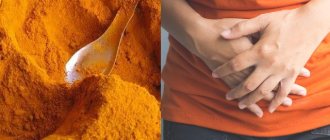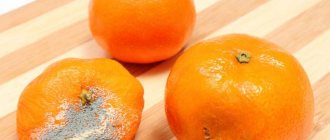Every nursing mother knows that she needs to carefully monitor her diet. After all, the foods she eats enter the baby’s body along with breast milk. And many foods can negatively affect a baby’s well-being, digestion, and stool. If the baby is already on complementary feeding, in this case you need to carefully select the baby’s diet. In this article we will find out which foods weaken a child's stool.
Features of the baby's stool
A baby's stool, especially in the first six months, may be different. Unlike bottle-fed children, it changes regularly in breastfed babies. In newborns, stool can happen 3-16 times a day; with artificial feeding, it happens 2-4 times. After 1.5 months the figure gradually begins to decrease. But even at this age, the baby can “go to the toilet” after each feeding.
After the introduction of complementary foods from six months, the frequency of stool decreases to 1-2 times a week. The smell is usually sour milk or absent altogether. There may be impurities in the form of a small amount of mucus or white lumps. The color and consistency of stool is affected by the foods that the nursing mother and baby eat.
As for color, infants' stool can be of different shades, including yellow, green and orange. With full breastfeeding, the stool is green, with artificial or mixed feeding - brown. At the beginning of complementary feeding, yellow, white and green spots often appear. Stools are affected not only by nutrition, but also by the medications the baby or mother takes while breastfeeding, the frequency of feedings, and the child’s physical activity.
The consistency of the stool also varies. Basically, it is liquid, since in the first months of life the baby receives only liquid milk food. With mixed or artificial feeding, the stool is darker and thicker. You will find out detailed information about what a baby's stool should be like at https://vskormi.ru/problems-with-baby/kakim-dolzhen-byt-stul-u-novorozhdennogo/.
Benefits of pomegranate
Pomegranate seeds contain a large amount of vitamins (A, C, B) and mineral salts (potassium, magnesium, iron). The fruit also contains various organic compounds in the form of complex carbohydrates, due to which it can have a positive effect on the body:
- Diuretic effect – increasing the formation and excretion of urine.
- Choleretic effect - enhancing the formation of bile in the liver, accelerating excretion.
- Antiseptic effect - some fruit compounds lead to the death of various pathogenic and conditionally pathogenic microorganisms.
- Antipyretic effect – pomegranate seeds have the ability to normalize temperature during fever. Recommended for pregnant women who are contraindicated in taking non-steroidal anti-inflammatory drugs.
- Increased immune system activity, including specific and nonspecific response.
- Reducing the severity of the inflammatory reaction at various locations in the body, including the organs of the digestive system.
- Vascular strengthening effect - taking the fruit reduces the fragility of microcirculatory vessels.
- Hemostatic effect - substances contained in pomegranate seeds accelerate the process of blood clot formation against the background of damage to the walls of blood vessels.
- Astringent effect - the formation of a thin protective film on the mucous membrane of the stomach or intestines in the area of integrity, in particular with peptic ulcer disease.
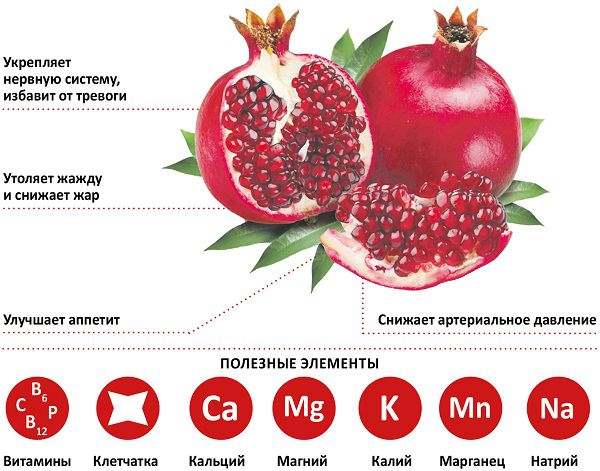
The fruit is a source of a large number of valuable microelements. After eating the fruit, vitamins and mineral salts enter the body, which helps normalize metabolism in adults and children.
Constipation in a baby
If the baby has bowel movements less than once every 1.5-2 days, and is accompanied by strong straining and straining, we can talk about constipation. Please note that bowel movements should be difficult and distressing for your child. The baby may often be capricious, his health often worsens, abdominal pain and fatigue appear.
Most often, constipation occurs in children under six months of age, since the intestines have not yet strengthened and are not accustomed to new conditions. Do not rush to start treatment, and before using any medications, be sure to consult your pediatrician!

To improve your baby’s bowel movements, review the diet of both the nursing mother and the baby, if he is already on complementary foods. Include laxative foods in your diet when breastfeeding and exclude strengthening ones. Find out what foods cause constipation here.
Constipation can be caused by the wrong mixture. If the baby is bottle-fed or mixed-fed, choose a more suitable diet. Choose the most adapted and hypoallergenic mixtures. With such problems, many nursing mothers choose fermented milk nutrition from Nutrilon, Nan or Nutrilak. Now let’s look at what foods weaken a child’s intestines.
Health starts from the gut
Today it is no secret to anyone that many health problems could have been avoided if the condition of the intestines had been monitored in a timely manner. It is a polluted intestine that becomes the cause of most diseases, since waste and toxins that accumulate here for years begin to pollute the body. If you don’t pay attention to problems with your intestines at first, over time it will be much more difficult to solve them.
What to do if intestinal function is disrupted? It is no secret that the refined products we consume do not help improve its functioning, but only worsen the situation. Many people believe that a laxative can help with this condition. This is partly true, but you still shouldn’t rely completely on chemicals. After all, chemistry remains chemistry and the body definitely does not benefit from its use. How to be? Let it be as it is?
Laxative products come to the aid of people suffering from intestinal dysfunction. Laxative products have a natural ability to cleanse the intestines without causing any harmful effects on the body as a whole. This is why laxative products are much more preferable than chemicals sold in pharmacies. Therefore, knowing which products are laxatives and how to use them, you provide invaluable help to the body.
List of laxative foods
- Beets and beet juice;
- Sea kale;
- Pumpkin and zucchini;
- Grapes and grape juice;
- Plum and cherry;
- Apricots and bananas;
- Prunes and dried apricots;
- Fermented milk products (kefir, yogurt, cheese, etc.);
- Oatmeal, corn and buckwheat porridge;
- Vegetable oil;
- Quail eggs.
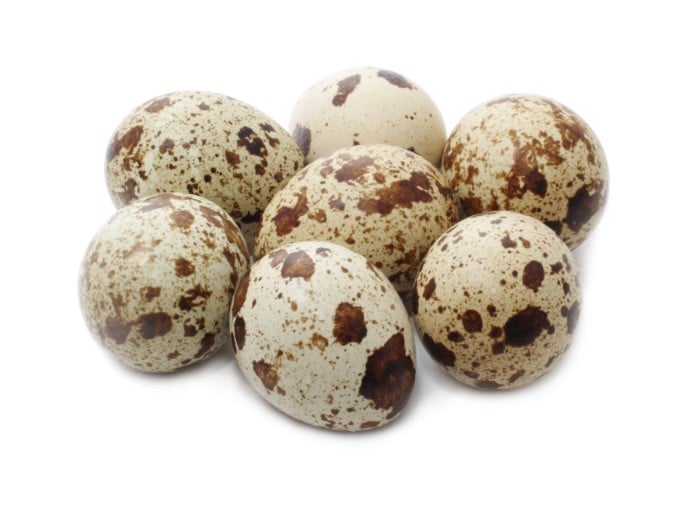
Natural products that have a laxative effect
Products that have a laxative effect include many natural and medicinal drugs.
The safest way to cleanse the intestines is, of course, to eat natural products that can not only remove toxins from the body, but also maintain the proper functioning of the gastrointestinal tract.
- have a large amount of fiber, which is needed in order to cause a laxative effect and improve the absorption of foods. This fruit is rich in potassium; with the help of a banana, you can restore the functioning of the gastrointestinal tract.
- Apples
regulate bowel movements and control the proper functioning of the intestines. - Melon
also has a laxative effect, but you should only eat it on an empty stomach. When interacting with other products, melon can decompose and begin to ferment, and the ability to quickly digest is lost. - Many fresh berries
have a laxative effect; doctors highly recommend using them for constipation. You can eat all fruits, but it is important that they are fresh, because then constipation cannot be avoided. - Raw vegetables
are rich in fiber and can improve the functioning of the gastrointestinal tract. You can eat all vegetables, but the most suitable ones are: beets, carrots, tomatoes, cabbage. - very rich in vitamins and various substances. If you eat one fruit a day, you can easily limit yourself from constipation.
- They are excellent for constipation and cleanse the intestinal tract.
- Prunes
on their own have a good laxative effect, but you can add prunes to milk drinks. How to use prunes for constipation is written in.
The following products are also good for constipation:
Fried, stewed, baked and raw onions- Peas and legume products have a good laxative effect.
Various soups with these products cleanse the intestinal channels and help the proper absorption of food and nutrients. - All foods that contain fiber
can relieve constipation. These include bran. If you use bran bread and simple cuts, you can remove a lot of toxins and eliminate constipation. - Cucumber pickle
can relieve constipation in 2-3 days. Every day you need to drink 3-4 glasses of cucumber pickle. - Dried fruits
differ from fresh fruits in the amount of vitamins, but they also have a good effect on the gastrointestinal tract and fight constipation. - Oil
has a laxative effect which is recommended to be added to all porridges. Milk also works well against constipation.
One of the main causes of constipation and diarrhea is the use of various medications
.
To improve bowel function after taking medications, you need to drink a simple remedy
...
Medicinal properties of pomegranate peel
This is a well-known remedy that suppresses the development of harmful microbes and has a powerful anti-inflammatory effect. If you have a nervous system disorder, pomegranate peels can be added to tea. In addition, they are recommended to be taken for malaria, colds and colitis. But the main effect is achieved when using pomegranate peels to treat diarrhea.
The peel of the fruit contains polyphenyl, which helps to quickly suppress dysentery and E. coli. Pomegranate peel also has an anthelmintic effect. A special decoction is prepared for this. To prepare medicine for diarrhea, it is recommended to prepare medicinal crusts in advance. To do this, carefully remove them from a well-washed and dried fruit, cutting off the pulp as much as possible. Healing substances that effectively combat intestinal disorders are concentrated in the upper layers of the peel.

Grind the crusts obtained in this way and spread them in a thin layer on paper. They should be dried for about a week, shaking the raw materials regularly. If even a small amount of moisture gets on it, it begins to deteriorate. Dried raw materials are stored in a cool place in paper bags. When it is necessary to get rid of diarrhea, the crusts are crushed using a mixer or coffee grinder.
One teaspoon of raw material is brewed with a glass of boiling water and placed in a water bath for ten minutes. After this, the composition should infuse for an hour. How quickly does this remedy work? Judging by the reviews of patients, if the proportions are fully observed, a single dose is enough to forget about the unpleasant condition.
In some advanced cases, it is allowed to take the medication again, three hours after the first. For anemia, it is recommended to drink a decoction of pomegranate peel in courses to cleanse the blood of toxins. This remedy is also useful for women in menopause.
Description
Pomegranate is a perennial deciduous subtropical fruit tree, much less commonly a shrub of the pomegranate (derbennikov) family, native to Persia, which can reach a height of five meters. It has a developed root system, thin branches with thorns, glossy opposite leaves and bright red flowers that appear on the branches in early spring and persist until late summer.

What should you avoid if you are constipated?
In contrast to laxative products, there is a wide category of dishes that help strengthen the stool. A healthy person can consume them almost unlimitedly in combination with foods that have the opposite effect, but a person suffering from constipation is better off abstaining. The list of such products includes:
1. Dishes high in starch - mashed potatoes, polished (white) rice, semolina porridge, cereal decoctions, jelly, white bread, pastries.
2. Products that contain tannins and astringents - black tea, ground coffee, cocoa, chocolate, pomegranate, persimmon, bird cherry, fresh grapes and red wine, nuts, legumes, blueberries in any form.
3. Applesauce and green bananas actively absorb water from the environment, slowing down the passage of other food.
4. Old fermented milk drinks, cheese, cottage cheese.
5. Dishes that slow down gastric peristalsis - fried, smoked, whole boiled milk, animal fats, fatty meats, rich broths, mushrooms.
Irregular bowel movements can be a consequence of intestinal pathologies, injuries, neuroses, and diseases of other organs. May be a side effect of taking various medications. May develop due to an inactive lifestyle. But, in the vast majority of cases, everything is much simpler. And those who have it are to blame for the problem. The reason is poor nutrition! And in order to gain vigor and good health, it is not at all necessary to undergo a thorough examination and long treatment. You just need to replace the contents of your refrigerator, and then use it at the right time and in the right proportions.
Diet mistakes that lead to constipation:
- Insufficient volume of chyme (food bolus). Only chyme of significant volume gives the intestines a signal to start peristalsis (a wave of contractions). The ideal way to create such chyme is to consume food containing plant fibers that do not dry out when they remain in the stomach. Such food has a large volume with low calorie content;
- Lack of water in the intestines. To start intestinal peristalsis, a significant amount of water must accumulate in it. This is ensured by the presence of hyperosmotic substances in the food consumed, for example plant sugars, which are capable of attracting large volumes of liquid;
- Consumption of high-calorie, low-volume foods. The catch is that when we eat such food, we visually do not notice the stretching of the abdomen, and there is no feeling of fullness in the stomach. But after digestion, such food can linger in the intestines for a very long time without causing peristalsis;
- Lack of fiber in food. Fiber, which is not absorbed by the body, passes through the intestines like a “battering ram”, loosening the accumulated masses and carrying them along with it;
- Consumption of foods that lead to intestinal slagging;
- Excess fat, sugar, starch, abundant consumption of baked goods, fried and smoked foods lead to rotting processes in the intestines. Fecal stones form, creating “plugs” and injuring the mucous membrane;
- Lack of lactic acid bacteria in the food consumed. The lack of these bacteria leads to disruption of the intestinal microflora, insufficient absorption of nutrients by its walls, and rotting processes develop.
- Lack of potassium and magnesium in the food consumed. Potassium salts are extremely important for contraction of intestinal muscles, and magnesium salts are essential for the conduction of nerve impulses.
Errors in diet leading to constipation:
- Large meals with long breaks. Eating 3 meals a day is only useful for saving time. But for normal functioning of the intestines, and the body as a whole, 6 meals a day in small portions is ideal.
- A hearty breakfast in bed. When you wake up, you first need to drink about 300 milliliters of water at room temperature, move around and only after 20-30 minutes start breakfast.
- Eat a large meal before bed. A hearty dinner is not contraindicated. On the contrary, during the night the body manages to process all slowly digested food. But from the moment of such dinner until bedtime, at least 2 hours should pass.
- Drink water only when you are “thirsty.” The body does not always signal a lack of water by feeling thirsty. Weakness and a feeling of hunger, even when you have eaten enough, can also be symptoms of a lack of water. You need to drink at least one and a half liters of clean water per day, distributing this amount evenly throughout the day.
How are dried apricot fruits obtained?
Dried apricots are the fruits of the apricot tree, which are dried for a certain time in the sun. To obtain this wonderful dried fruit, only high-quality and ripe fruits are selected. Then they are thoroughly washed and dried. Depending on the variety, the fruits are converted into dried fruits using various technologies. Small apricots are not divided into halves, but dried whole, along with the seeds. This is how apricots turn out.
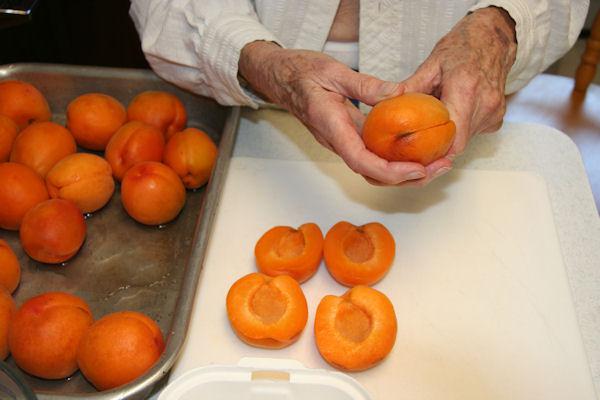
Larger fruits are prepared by first removing the seeds. Kaisa is a whole, uncut fruit, dried without seeds, and dried apricots are pre-cut in half. To ensure that these dried fruits retain their excellent taste and benefits, they are dried under the sun in specially designated places for 6-8 days. To obtain one kilogram of dried apricots or kaisa, more than 3 kilograms of fresh apricot fruits are required.
Effect of legumes on digestion
Legume products that help improve bowel function include:
- lentils;
- peas;
- beans;
- chickpeas
They contain, like vegetables and fruits, soluble and insoluble fiber, which has a laxative effect.
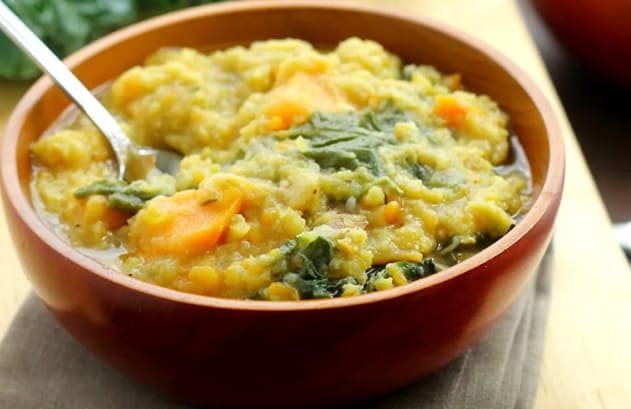
In case of exacerbation of gastritis and gastric ulcer, legumes are completely excluded from the list of consumed foods. At the same time, they have anti-inflammatory properties and can be useful in some gastrointestinal pathologies, for example, Crohn's disease.
Among the side effects of dishes made from lentils, peas or beans is increased flatulence.
Features of the use of dried apricots
Dried apricots can be used as needed and for preventive purposes. Dried apricots for constipation are consumed in the form of mixtures, sweets or decoctions. To get rid of the problem, it is enough to eat 100-150 g of dried apricots per day. It is advisable to do this before bedtime. The fruits should first be poured with boiling water to soften. The product has a laxative effect in the morning.
When choosing dried fruits in a store, you need to pay attention to the following:
- Aroma. The pleasant smell of apricot indicates that the dried apricots have not been subjected to chemical treatment.
- Form. Preference should be given to oval or round fruits.
- Appearance. You need to choose dried apricots of gray-brown or pale yellow shades. A bright orange color indicates that the dried fruit has been dried using sulfur dioxide.
- Elasticity. High-quality dried apricots have medium elasticity. Excessive softness, as well as excessive hardness, indicate violations of the drying process.
Grapes strengthen or weaken stools
This is truly a blessed fruit. Any grape variety brings constant benefits to the human body. The main requirement is not to overeat grapes, especially for people prone to obesity. All grape varieties contain high levels of fructose, sucrose, raffinose and xylose. However, any excess in food leads to weight gain, and
grapes are no exception. Now it's time to answer the main question - grapes do not strengthen the chair. Moreover, it improves intestinal motility, promotes the proliferation of beneficial microflora, due to which the stool acquires a soft consistency and defecation occurs easily and comfortably. Grapes can and should be eaten with seeds, because they contain a lot of useful substances that actively fight putrefactive bacteria. The substances picgenols, which have an antioxidant effect, were found in grape seeds. Grape skins also contain a lot of useful substances that improve digestion and intestinal motility.
Recipes
Below are several delicious and healthy recipes for dishes made from laxative products.
"Laxative" sandwich
What do Israeli proctologists say about constipation?
Constipation is very dangerous and very often this is the first symptom of hemorrhoids! Few people know, but getting rid of it is very simple. Just 3 cups of this tea a day will relieve you of constipation, flatulence and other problems with the gastrointestinal tract...
Among the useful laxative products you need to purchase:
- dried apricots, figs and prunes in the same proportion, which is equal to 300 grams.
All this needs to be mixed and put through a meat grinder. Then, using a teaspoon, you need to put the mixture on a piece of black bread. This dish is great for relieving constipation and also feels good in the gastrointestinal tract.
Salad "Broom"
From the name you can understand a lot of things, but the main thing is that when you take this dish, all unnecessary and harmful substances are “swept out” from the body.
To prepare it, you need to grate 1 apple (preferably red), finely chop a tangerine, grind some nuts and add 1 tablespoon of honey. Mix the whole mixture well.
The laxative effect of a number of foods occurs due to:

